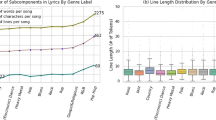Abstract
Authorship Identification is the branch of authorship analysis concerned with uncovering the author of a written document. Methods devised for Authorship Identification typically employ stylometry (the analysis of unconscious traits that authors exhibit while writing), and are expected not to make inferences grounded on the topics the authors usually write about (as reflected in their past production). In this paper, we present a series of experiments evaluating the use of feature sets based on rhythmic and psycholinguistic patterns for Authorship Verification and Attribution in Spanish political language, via different approaches of text distortion used to actively mask the underlying topic. We feed these feature sets to a SVM learner, and show that they lead to results that are comparable to those obtained by the BETO transformer when the latter is trained on the original text, i.e., when potentially learning from topical information.
Access this chapter
Tax calculation will be finalised at checkout
Purchases are for personal use only
Similar content being viewed by others
Notes
- 1.
- 2.
- 3.
- 4.
We employ the Spanish version of the dictionary, which is based on LIWC2007.
- 5.
We use following categories for each macro-categoy: (i) Yo, Nosotro, TuUtd, ElElla, VosUtds, Ellos, Pasado, Present, Futuro, Subjuntiv, Negacio, Cuantif, Numeros, verbYO, verbTU, verbNOS, verbVos, verbosEL, verbELLOS, formal, informal; (ii) MecCog, Insight, Causa, Discrep, Tentat, Certeza, Inhib, Incl, Excl, Percept, Ver, Oir, Sentir, NoFluen, Relleno, Ingerir, Relativ, Movim; (iii) Maldec, Afect, EmoPos, EmoNeg, Ansiedad, Enfado, Triste, Asentir, Placer. We avoid employing categories that would repeat information already captured by the POS tags, or topic-related categories such as Dinero or Familia.
- 6.
We also performed preliminary experiments with other learners: SVM showed a remarkably better performance than Random Forest, while no significant differences were noticed between SVM and Logistic Regression.
- 7.
- 8.
https://huggingface.co/dccuchile/bert-base-spanish-wwm-cased. This model obtained better results than the ‘uncased’ version in preliminary experiments.
References
Bevendorff, J., et al.: Overview of PAN 2021: authorship verification, profiling hate speech spreaders on twitter, and style change detection. In: Candan, K.S., et al. (eds.) Experimental IR Meets Multilinguality, Multimodality, and Interaction: 12th International Conference of the CLEF Association, CLEF 2021, Virtual Event, September 21–24, 2021, Proceedings, pp. 419–431. Springer, Cham (2021). https://doi.org/10.1007/978-3-030-85251-1_26
Bischoff, S., et al.: The importance of suppressing domain style in authorship analysis. arXiv:2005.14714 (2020)
Boyd, R.L.: Mental profile mapping: a psychological single-candidate authorship attribution method. PLoS ONE 13(7), e0200588 (2018)
Corbara, S., Moreo, A., Sebastiani, F.: Syllabic quantity patterns as rhythmic features for Latin authorship attribution. arXiv arXiv:2110.14203 (2021)
Fernández-Cabana, M., Rúas-Araújo, J., Alves-Pérez, M.T.: Psicología, lenguaje y comunicación: Análisis con la herramienta LIWC de los discursos y tweets de los candidatos a las elecciones gallegas. Anuario de Psicología 44(2), 169–184 (2014)
Halvani, O., Graner, L., Regev, R.: TAVeer: an interpretable topic-agnostic authorship verification method. In: Proceedings of the 15th International Conference on Availability, Reliability and Security, ARES 2020, pp. 1–10 (2020)
Pennebaker, J.W., Boyd, R.L., Jordan, K., Blackburn, K.: The development and psychometric properties of LIWC2015. Technical report (2015)
Plecháč, P.: Relative contributions of Shakespeare and Fletcher in Henry VIII: an analysis based on most frequent words and most frequent rhythmic patterns. Digit. Sch. Humanit. 36(2), 430–438 (2021)
Stamatatos, E.: A survey of modern authorship attribution methods. J. Am. Soc. Inform. Sci. Technol. 60(3), 538–556 (2009)
Stamatatos, E.: Masking topic-related information to enhance authorship attribution. J. Am. Soc. Inf. Sci. 69(3), 461–473 (2018)
Acknowledgment
The work by Silvia Corbara has been carried out during her visit at the Universitat Politècnica de València and has been supported by the AI4Media project, funded by the European Commission (Grant 951911) under the H2020 Programme ICT-48-2020.
The research work by Paolo Rosso was partially funded by the Generalitat Valenciana under DeepPattern (PROMETEO/2019/121).
Author information
Authors and Affiliations
Corresponding author
Editor information
Editors and Affiliations
Rights and permissions
Copyright information
© 2022 The Author(s), under exclusive license to Springer Nature Switzerland AG
About this paper
Cite this paper
Corbara, S., Chulvi Ferriols, B., Rosso, P., Moreo, A. (2022). Investigating Topic-Agnostic Features for Authorship Tasks in Spanish Political Speeches. In: Rosso, P., Basile, V., Martínez, R., Métais, E., Meziane, F. (eds) Natural Language Processing and Information Systems. NLDB 2022. Lecture Notes in Computer Science, vol 13286. Springer, Cham. https://doi.org/10.1007/978-3-031-08473-7_36
Download citation
DOI: https://doi.org/10.1007/978-3-031-08473-7_36
Published:
Publisher Name: Springer, Cham
Print ISBN: 978-3-031-08472-0
Online ISBN: 978-3-031-08473-7
eBook Packages: Computer ScienceComputer Science (R0)




